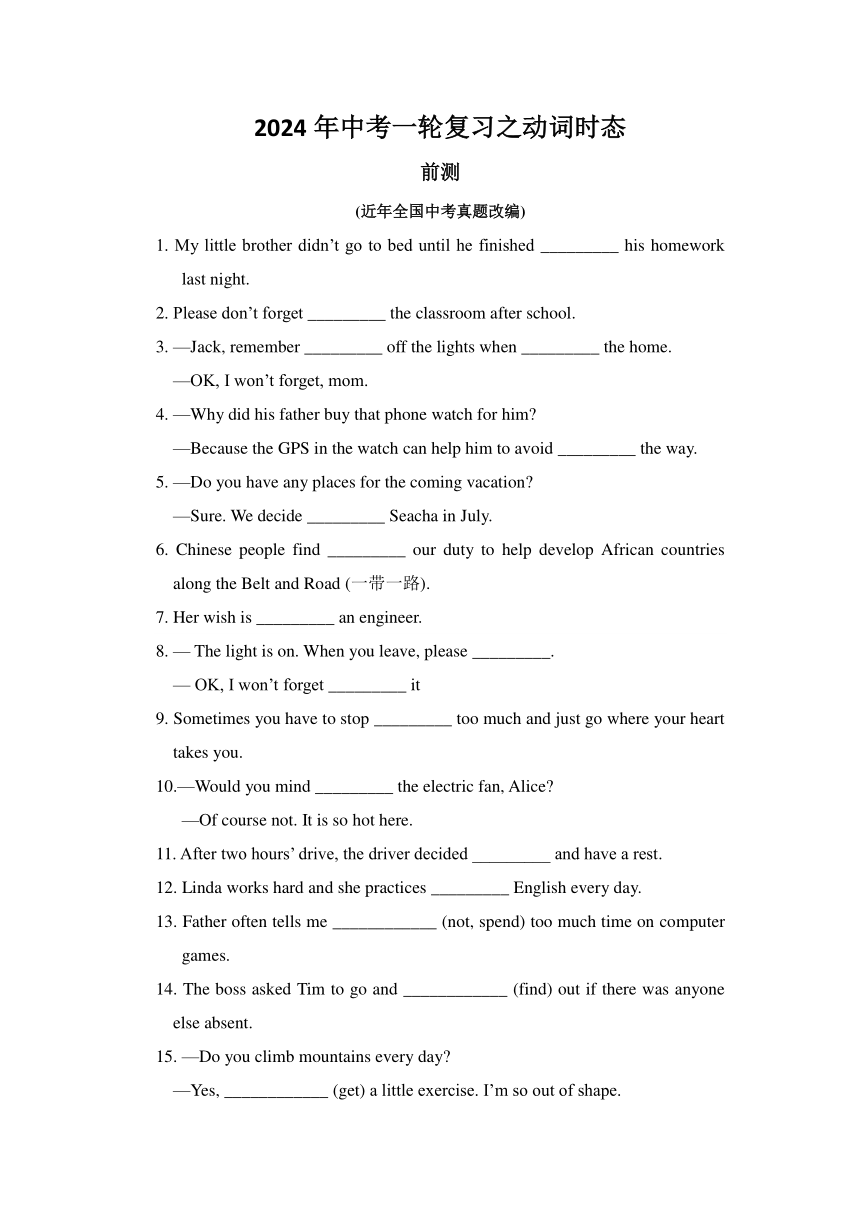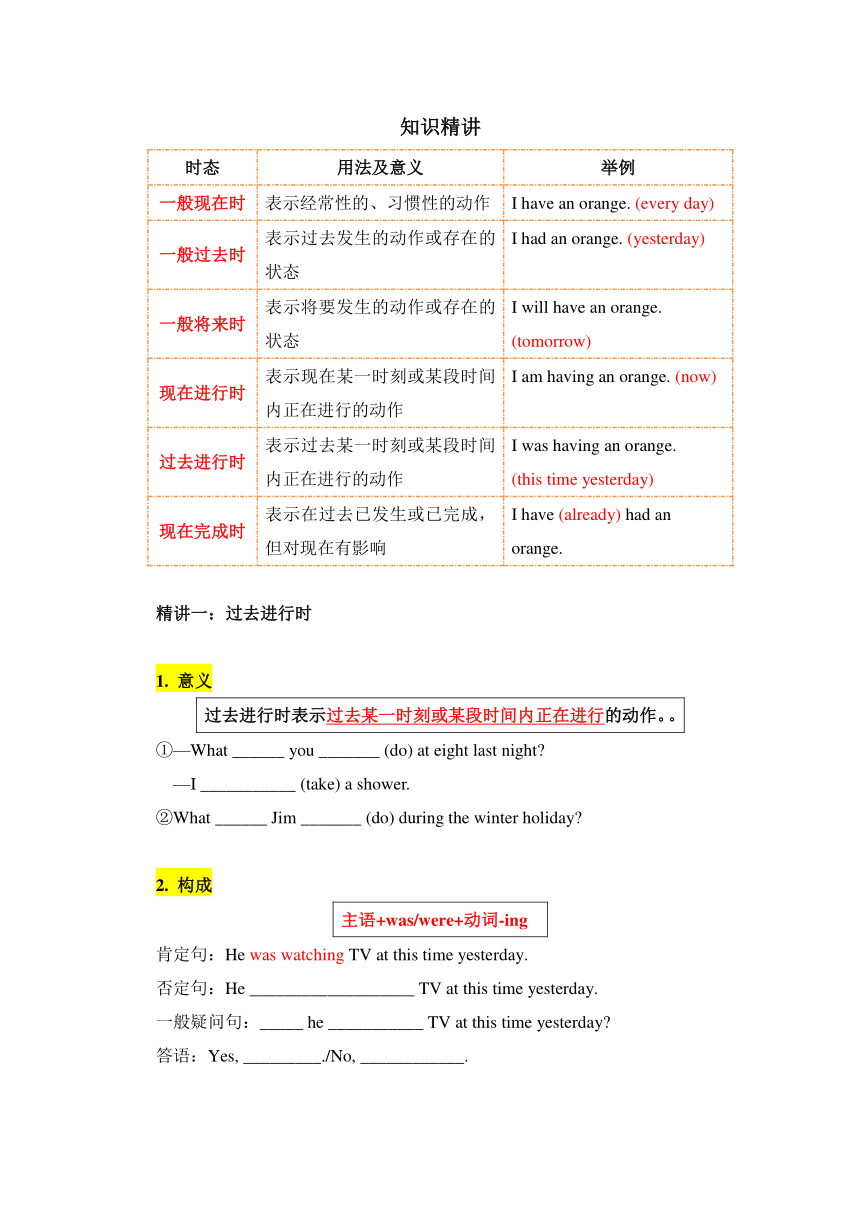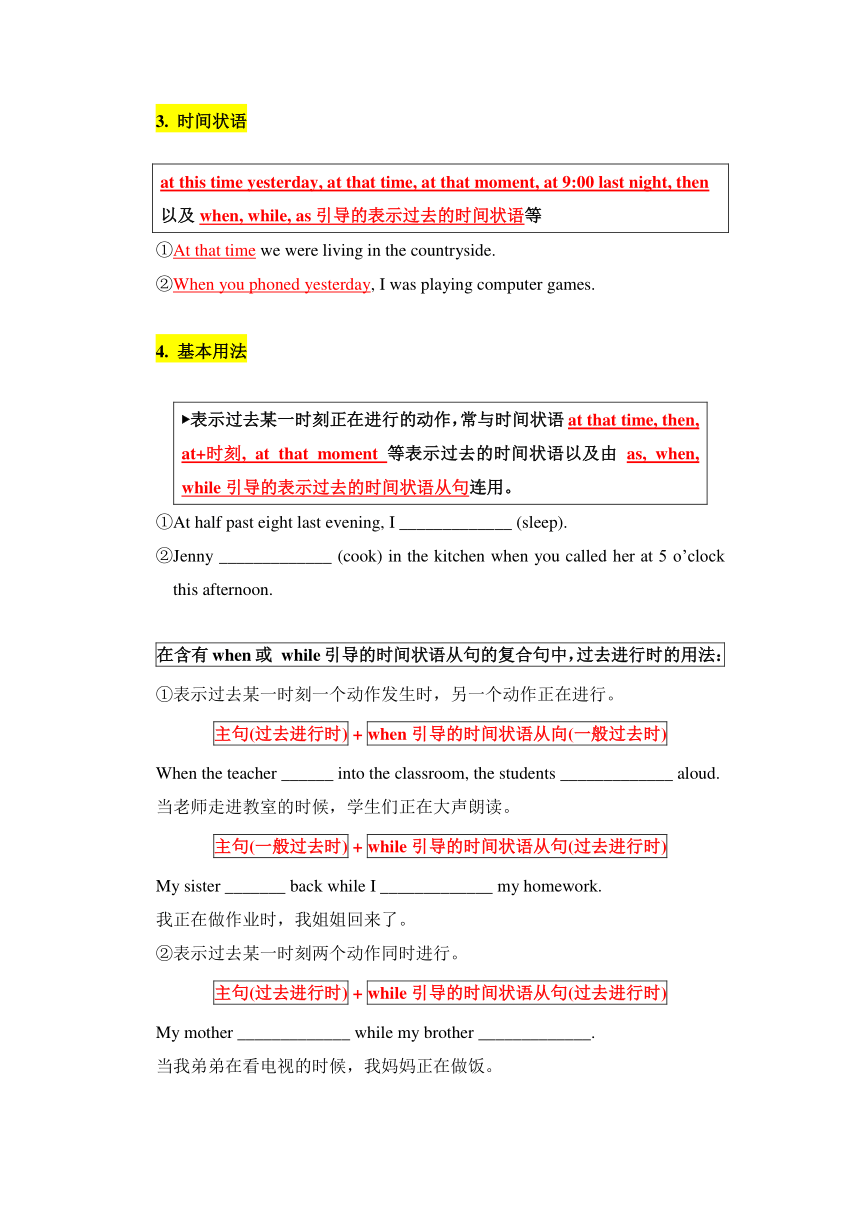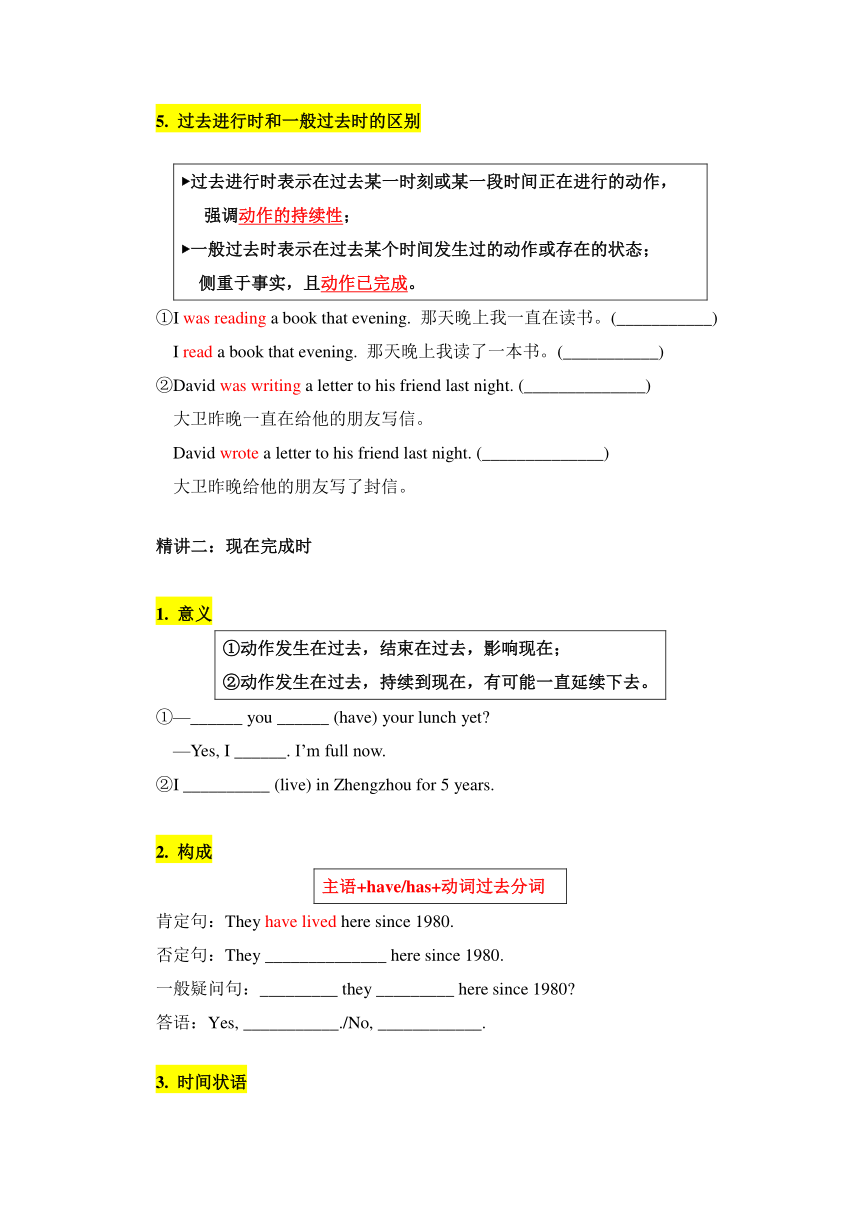2024年人教版中考一轮复习动词时态(无答案)
文档属性
| 名称 | 2024年人教版中考一轮复习动词时态(无答案) |  | |
| 格式 | docx | ||
| 文件大小 | 36.4KB | ||
| 资源类型 | 教案 | ||
| 版本资源 | 人教新目标(Go for it)版 | ||
| 科目 | 英语 | ||
| 更新时间 | 2024-03-03 20:39:08 | ||
图片预览




文档简介
2024年中考一轮复习之动词时态
前测
(近年全国中考真题改编)
1. My little brother didn’t go to bed until he finished _________ his homework last night.
2. Please don’t forget _________ the classroom after school.
3. —Jack, remember _________ off the lights when _________ the home.
—OK, I won’t forget, mom.
4. —Why did his father buy that phone watch for him
—Because the GPS in the watch can help him to avoid _________ the way.
5. —Do you have any places for the coming vacation
—Sure. We decide _________ Seacha in July.
6. Chinese people find _________ our duty to help develop African countries along the Belt and Road (一带一路).
7. Her wish is _________ an engineer.
8. — The light is on. When you leave, please _________.
— OK, I won’t forget _________ it
9. Sometimes you have to stop _________ too much and just go where your heart takes you.
10.—Would you mind _________ the electric fan, Alice
—Of course not. It is so hot here.
11. After two hours’ drive, the driver decided _________ and have a rest.
12. Linda works hard and she practices _________ English every day.
13. Father often tells me ____________ (not, spend) too much time on computer games.
14. The boss asked Tim to go and ____________ (find) out if there was anyone else absent.
15. —Do you climb mountains every day
—Yes, ____________ (get) a little exercise. I’m so out of shape.
知识精讲
时态 用法及意义 举例
一般现在时 表示经常性的、习惯性的动作 I have an orange. (every day)
一般过去时 表示过去发生的动作或存在的状态 I had an orange. (yesterday)
一般将来时 表示将要发生的动作或存在的状态 I will have an orange. (tomorrow)
现在进行时 表示现在某一时刻或某段时间内正在进行的动作 I am having an orange. (now)
过去进行时 表示过去某一时刻或某段时间内正在进行的动作 I was having an orange. (this time yesterday)
现在完成时 表示在过去已发生或已完成,但对现在有影响 I have (already) had an orange.
精讲一:过去进行时
1. 意义
过去进行时表示过去某一时刻或某段时间内正在进行的动作。。
①—What ______ you _______ (do) at eight last night
—I ___________ (take) a shower.
②What ______ Jim _______ (do) during the winter holiday
2. 构成
主语+was/were+动词-ing
肯定句:He was watching TV at this time yesterday.
否定句:He ___________________ TV at this time yesterday.
一般疑问句:_____ he ___________ TV at this time yesterday
答语:Yes, _________./No, ____________.
3. 时间状语
at this time yesterday, at that time, at that moment, at 9:00 last night, then 以及when, while, as引导的表示过去的时间状语等
①At that time we were living in the countryside.
②When you phoned yesterday, I was playing computer games.
4. 基本用法
表示过去某一时刻正在进行的动作,常与时间状语at that time, then, at+时刻, at that moment等表示过去的时间状语以及由as, when, while引导的表示过去的时间状语从句连用。
①At half past eight last evening, I _____________ (sleep).
②Jenny _____________ (cook) in the kitchen when you called her at 5 o’clock this afternoon.
在含有when或 while引导的时间状语从句的复合句中,过去进行时的用法:
①表示过去某一时刻一个动作发生时,另一个动作正在进行。
主句(过去进行时) + when引导的时间状语从向(一般过去时)
When the teacher ______ into the classroom, the students _____________ aloud.
当老师走进教室的时候,学生们正在大声朗读。
主句(一般过去时) + while引导的时间状语从句(过去进行时)
My sister _______ back while I _____________ my homework.
我正在做作业时,我姐姐回来了。
②表示过去某一时刻两个动作同时进行。
主句(过去进行时) + while引导的时间状语从句(过去进行时)
My mother _____________ while my brother _____________.
当我弟弟在看电视的时候,我妈妈正在做饭。
5. 过去进行时和一般过去时的区别
过去进行时表示在过去某一时刻或某一段时间正在进行的动作, 强调动作的持续性; 一般过去时表示在过去某个时间发生过的动作或存在的状态; 侧重于事实,且动作已完成。
①I was reading a book that evening. 那天晚上我一直在读书。(___________)
I read a book that evening. 那天晚上我读了一本书。(___________)
②David was writing a letter to his friend last night. (______________)
大卫昨晚一直在给他的朋友写信。
David wrote a letter to his friend last night. (______________)
大卫昨晚给他的朋友写了封信。
精讲二:现在完成时
1. 意义
①动作发生在过去,结束在过去,影响现在; ②动作发生在过去,持续到现在,有可能一直延续下去。
①—______ you ______ (have) your lunch yet
—Yes, I ______. I’m full now.
②I __________ (live) in Zhengzhou for 5 years.
2. 构成
主语+have/has+动词过去分词
肯定句:They have lived here since 1980.
否定句:They ______________ here since 1980.
一般疑问句:_________ they _________ here since 1980
答语:Yes, ___________./No, ____________.
3. 时间状语
already, just, recently, in the past few years, so far, before, yet, never, ever, for+时间段, since+时间点或从句…
①I have never traveled by plane before.
②I have been in Beijing for two years.
4. 基本用法
表示过去发生或已经完成的动作对现在造成的影响和结果。 常与already, yet, just, ever, never, before等副词连用。
My mother ____________ (clean) the windows already, so the room looks much brighter.
现在完成时表示过去已经开始并持续到现在的动作或状态,也许还要持续下去。常与for和since等表时间段的词连用。“for+时间段”,“since+时间点”。
①—How long _______ you ________ (be) in New York
—I _________ in New York for three years.
②He ________ (be) here since five years ago.
5. have/has been to, have/has gone to, have/has been in用法辨析
have been to+地名,曾经到过某地行 have gone to+地点,去了某地已走远 have been in 已在某地呆多久
①He ______________ Beijing. 他曾经去过北京。
②He ______________ Beijing. 他去北京了。
③He ______________ Beijing for ten years. 他在北京呆了十年了。
6. 非延续性动词和延续性动词的转换
非延续性动词的完成时态和表示一段时间的时间状语连用时,要转化为延续性动词。可以借助于be短语或其他动词。
①The old man ______ two years. 这个老人两年前死了。
The old man ______________ for two years. 这个老人死了两年了。
②He __________ a new dictionary two days ago. 两天前他买了一本新词典。
He ___________ the new dictionary for two days. 这本新词典他买了两天了。
可以用“It is/has been +一段时间+ since从句(用一般过去时)” 或“一段时间+has passed+ since从句”进行转换。 从句谓语动词可用非延续性动词。
①It’s two years _______ the old man _______. (die)
②Two days has passed _______ he _______ the new dictionary. (buy)
短暂性动词可用于现在完成时的否定句中,表示一种持续的状态,可以和表示一段时间的状语连用。
①He hasn’t left Shanghai for ten years.
②I haven’t bought anything for two months.
常见的非延续性动词变为延续性动词
begin/start leave go
borrow come return
born join die
buy arrive/reach open
marry finish/end close
catch a cold fall asleep make friends
7. 现在完成时和一般过去时的区别
现在完成时强调的过去的动作对现在造成的影响和结果,与现在的情况有联系,不能和表示过去的时间状语连用。 而一般过去时表示过去的动作或状态,和现在不发生联系。
①I _____________ Beijing. 我去过北京。
(我对北京有所了解)
I _______ to Beijing last year. 我去年去过北京。
(只说我去年去过北京,不涉及现在的情况)
②She ___________ here since 2012. 2012年以来她一直住在这里。
(她现在还住在这里)
She ______ here in 2012. 2012年她住在这里。
(不涉及现在她是否还住在这里)
即时训练
1. My father ___________ (work) in a panda protection center for 10 years, so he knows a lot about pandas.
2. —I went to your home yesterday morning, but you weren’t in.
—Well, I ___________ (walk) along the river at that time.
3. —Oh! What’s wrong with your finger
—I hurt it while I ___________ (make) a model plane.
4. Today, all the erhu masters play and praise Erquan Yingyue. It ___________ (become) one of China’s national treasures.
5. Our school life ___________ (change) a lot since 2017. We have more activities now.
6. David fell asleep fast while he ___________ (read) a newspaper.
7. —Were you at home at 9 o’clock last night
—Yes, I ___________ (take) a shower at that time.
8. —Where is Mr. Green
—He ___________ (has gone to/has been to) the bookshop. You have to wait for him.
9. —I went to your office at 9:00 yesterday morning, but you were not in.
—Sorry, I ___________ (talk) with the manager in the meeting room at that time.
10. —Is everyone here, Jonathan
—No, Sir. Millie is absent. She ___________ (ill) for two days.
后测
(近年全国中考真题改编)
1. — Mike, can I borrow your Tom Sawyer and Treasure Island
—Sorry, I _______________ (lend) them to David. He will return them to me next week.
2. —When will your brother go to Australia
—He _______________ (be) Sydney since four months ago.
3. In the past, my grandparents _______________ (live) a hard life, but their life _______________ (improve) a lot over the years.
4. The zoo keeper is worried because the number of visitors _______________ (become) smaller and smaller.
5. —I said hello to you just now, but you didn’t hear me.
—Oh, sorry. I _______________ (think) about the coming test at that time.
6. —Have you read Oliver Twist _______________
—Yes, I’ve _______________ read it three times.
7. —Have you ever been to Xiamen
—_______________. But I hear it’s a beautiful city. I plan to go there this summer.
8. —Can you answer the door, Jim I _______________ (do) the dishes.
—I’m coming, dad.
9. —I called you about an hour ago, but no one answered.
—Oh, sorry. I _______________ (play) football in the garden.
10. —There is some knocking at the door.
—It must be the computer repairman. I _______________ (call) him to fix my computer.
前测
(近年全国中考真题改编)
1. My little brother didn’t go to bed until he finished _________ his homework last night.
2. Please don’t forget _________ the classroom after school.
3. —Jack, remember _________ off the lights when _________ the home.
—OK, I won’t forget, mom.
4. —Why did his father buy that phone watch for him
—Because the GPS in the watch can help him to avoid _________ the way.
5. —Do you have any places for the coming vacation
—Sure. We decide _________ Seacha in July.
6. Chinese people find _________ our duty to help develop African countries along the Belt and Road (一带一路).
7. Her wish is _________ an engineer.
8. — The light is on. When you leave, please _________.
— OK, I won’t forget _________ it
9. Sometimes you have to stop _________ too much and just go where your heart takes you.
10.—Would you mind _________ the electric fan, Alice
—Of course not. It is so hot here.
11. After two hours’ drive, the driver decided _________ and have a rest.
12. Linda works hard and she practices _________ English every day.
13. Father often tells me ____________ (not, spend) too much time on computer games.
14. The boss asked Tim to go and ____________ (find) out if there was anyone else absent.
15. —Do you climb mountains every day
—Yes, ____________ (get) a little exercise. I’m so out of shape.
知识精讲
时态 用法及意义 举例
一般现在时 表示经常性的、习惯性的动作 I have an orange. (every day)
一般过去时 表示过去发生的动作或存在的状态 I had an orange. (yesterday)
一般将来时 表示将要发生的动作或存在的状态 I will have an orange. (tomorrow)
现在进行时 表示现在某一时刻或某段时间内正在进行的动作 I am having an orange. (now)
过去进行时 表示过去某一时刻或某段时间内正在进行的动作 I was having an orange. (this time yesterday)
现在完成时 表示在过去已发生或已完成,但对现在有影响 I have (already) had an orange.
精讲一:过去进行时
1. 意义
过去进行时表示过去某一时刻或某段时间内正在进行的动作。。
①—What ______ you _______ (do) at eight last night
—I ___________ (take) a shower.
②What ______ Jim _______ (do) during the winter holiday
2. 构成
主语+was/were+动词-ing
肯定句:He was watching TV at this time yesterday.
否定句:He ___________________ TV at this time yesterday.
一般疑问句:_____ he ___________ TV at this time yesterday
答语:Yes, _________./No, ____________.
3. 时间状语
at this time yesterday, at that time, at that moment, at 9:00 last night, then 以及when, while, as引导的表示过去的时间状语等
①At that time we were living in the countryside.
②When you phoned yesterday, I was playing computer games.
4. 基本用法
表示过去某一时刻正在进行的动作,常与时间状语at that time, then, at+时刻, at that moment等表示过去的时间状语以及由as, when, while引导的表示过去的时间状语从句连用。
①At half past eight last evening, I _____________ (sleep).
②Jenny _____________ (cook) in the kitchen when you called her at 5 o’clock this afternoon.
在含有when或 while引导的时间状语从句的复合句中,过去进行时的用法:
①表示过去某一时刻一个动作发生时,另一个动作正在进行。
主句(过去进行时) + when引导的时间状语从向(一般过去时)
When the teacher ______ into the classroom, the students _____________ aloud.
当老师走进教室的时候,学生们正在大声朗读。
主句(一般过去时) + while引导的时间状语从句(过去进行时)
My sister _______ back while I _____________ my homework.
我正在做作业时,我姐姐回来了。
②表示过去某一时刻两个动作同时进行。
主句(过去进行时) + while引导的时间状语从句(过去进行时)
My mother _____________ while my brother _____________.
当我弟弟在看电视的时候,我妈妈正在做饭。
5. 过去进行时和一般过去时的区别
过去进行时表示在过去某一时刻或某一段时间正在进行的动作, 强调动作的持续性; 一般过去时表示在过去某个时间发生过的动作或存在的状态; 侧重于事实,且动作已完成。
①I was reading a book that evening. 那天晚上我一直在读书。(___________)
I read a book that evening. 那天晚上我读了一本书。(___________)
②David was writing a letter to his friend last night. (______________)
大卫昨晚一直在给他的朋友写信。
David wrote a letter to his friend last night. (______________)
大卫昨晚给他的朋友写了封信。
精讲二:现在完成时
1. 意义
①动作发生在过去,结束在过去,影响现在; ②动作发生在过去,持续到现在,有可能一直延续下去。
①—______ you ______ (have) your lunch yet
—Yes, I ______. I’m full now.
②I __________ (live) in Zhengzhou for 5 years.
2. 构成
主语+have/has+动词过去分词
肯定句:They have lived here since 1980.
否定句:They ______________ here since 1980.
一般疑问句:_________ they _________ here since 1980
答语:Yes, ___________./No, ____________.
3. 时间状语
already, just, recently, in the past few years, so far, before, yet, never, ever, for+时间段, since+时间点或从句…
①I have never traveled by plane before.
②I have been in Beijing for two years.
4. 基本用法
表示过去发生或已经完成的动作对现在造成的影响和结果。 常与already, yet, just, ever, never, before等副词连用。
My mother ____________ (clean) the windows already, so the room looks much brighter.
现在完成时表示过去已经开始并持续到现在的动作或状态,也许还要持续下去。常与for和since等表时间段的词连用。“for+时间段”,“since+时间点”。
①—How long _______ you ________ (be) in New York
—I _________ in New York for three years.
②He ________ (be) here since five years ago.
5. have/has been to, have/has gone to, have/has been in用法辨析
have been to+地名,曾经到过某地行 have gone to+地点,去了某地已走远 have been in 已在某地呆多久
①He ______________ Beijing. 他曾经去过北京。
②He ______________ Beijing. 他去北京了。
③He ______________ Beijing for ten years. 他在北京呆了十年了。
6. 非延续性动词和延续性动词的转换
非延续性动词的完成时态和表示一段时间的时间状语连用时,要转化为延续性动词。可以借助于be短语或其他动词。
①The old man ______ two years. 这个老人两年前死了。
The old man ______________ for two years. 这个老人死了两年了。
②He __________ a new dictionary two days ago. 两天前他买了一本新词典。
He ___________ the new dictionary for two days. 这本新词典他买了两天了。
可以用“It is/has been +一段时间+ since从句(用一般过去时)” 或“一段时间+has passed+ since从句”进行转换。 从句谓语动词可用非延续性动词。
①It’s two years _______ the old man _______. (die)
②Two days has passed _______ he _______ the new dictionary. (buy)
短暂性动词可用于现在完成时的否定句中,表示一种持续的状态,可以和表示一段时间的状语连用。
①He hasn’t left Shanghai for ten years.
②I haven’t bought anything for two months.
常见的非延续性动词变为延续性动词
begin/start leave go
borrow come return
born join die
buy arrive/reach open
marry finish/end close
catch a cold fall asleep make friends
7. 现在完成时和一般过去时的区别
现在完成时强调的过去的动作对现在造成的影响和结果,与现在的情况有联系,不能和表示过去的时间状语连用。 而一般过去时表示过去的动作或状态,和现在不发生联系。
①I _____________ Beijing. 我去过北京。
(我对北京有所了解)
I _______ to Beijing last year. 我去年去过北京。
(只说我去年去过北京,不涉及现在的情况)
②She ___________ here since 2012. 2012年以来她一直住在这里。
(她现在还住在这里)
She ______ here in 2012. 2012年她住在这里。
(不涉及现在她是否还住在这里)
即时训练
1. My father ___________ (work) in a panda protection center for 10 years, so he knows a lot about pandas.
2. —I went to your home yesterday morning, but you weren’t in.
—Well, I ___________ (walk) along the river at that time.
3. —Oh! What’s wrong with your finger
—I hurt it while I ___________ (make) a model plane.
4. Today, all the erhu masters play and praise Erquan Yingyue. It ___________ (become) one of China’s national treasures.
5. Our school life ___________ (change) a lot since 2017. We have more activities now.
6. David fell asleep fast while he ___________ (read) a newspaper.
7. —Were you at home at 9 o’clock last night
—Yes, I ___________ (take) a shower at that time.
8. —Where is Mr. Green
—He ___________ (has gone to/has been to) the bookshop. You have to wait for him.
9. —I went to your office at 9:00 yesterday morning, but you were not in.
—Sorry, I ___________ (talk) with the manager in the meeting room at that time.
10. —Is everyone here, Jonathan
—No, Sir. Millie is absent. She ___________ (ill) for two days.
后测
(近年全国中考真题改编)
1. — Mike, can I borrow your Tom Sawyer and Treasure Island
—Sorry, I _______________ (lend) them to David. He will return them to me next week.
2. —When will your brother go to Australia
—He _______________ (be) Sydney since four months ago.
3. In the past, my grandparents _______________ (live) a hard life, but their life _______________ (improve) a lot over the years.
4. The zoo keeper is worried because the number of visitors _______________ (become) smaller and smaller.
5. —I said hello to you just now, but you didn’t hear me.
—Oh, sorry. I _______________ (think) about the coming test at that time.
6. —Have you read Oliver Twist _______________
—Yes, I’ve _______________ read it three times.
7. —Have you ever been to Xiamen
—_______________. But I hear it’s a beautiful city. I plan to go there this summer.
8. —Can you answer the door, Jim I _______________ (do) the dishes.
—I’m coming, dad.
9. —I called you about an hour ago, but no one answered.
—Oh, sorry. I _______________ (play) football in the garden.
10. —There is some knocking at the door.
—It must be the computer repairman. I _______________ (call) him to fix my computer.
同课章节目录
